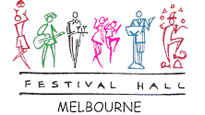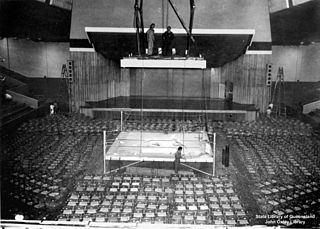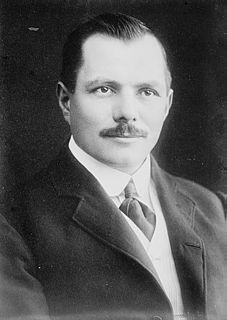| Founded | 1915 |
|---|---|
| Founder | John Wren, Richard Lean, Reg Baker |
| Headquarters | Australia |
Stadiums Limited is an Australian company established in the late 1890s that owned and administered four venues on Australia's east coast at West Melbourne Stadium, [1] Sydney Stadium, Leichhardt Stadium and Brisbane Festival Hall. It was founded in 1915 by John Wren [2] [3] and Dick Lean Senior who acted as the general manager. Incorporated in its final form in 1915, prior to this, Wren worked with Lean Senior, purchasing the various locations, including the site of what became the West Melbourne Hall, and ultimately Festival Hall from Reginald (Snowy) Baker. Stadiums initially began presenting both boxing and professional wrestling. Wren, as he did in other parts of his life, offered a great deal of money to boxers and wrestlers to perform. [4] The operations of Stadiums Ltd changed in the second half of the 20th century, as the venues began to be predominantly used for live music and for television broadcasts. Notably, it was Dick Lean Junior as the promoter and Managing Director of Stadiums Ltd who booked the Beatles to play Australia in 1964 - arguably the most successful Concert coup in Australian entertainment history. Dick Lean became Managing Director of Stadiums, vastly increasing the Company profitability by continuing to promote and bring to Australia many of the major headline acts during the 1960s, 1970s and 1980s - all who performed in the Stadium's venues in Melbourne, Sydney and Brisbane.
The Wren family and others still own Stadiums Ltd as of 2017, and it remains one of Australia oldest private companies.
Post an extended period of losses over many years and the sale of the company's last operational asset, Festival Hall - Melbourne, in December 2020 - Stadiums Pty Ltd entered voluntary liquidation and was formally wound up in July 2021.

The 1982 Commonwealth Games were held in Brisbane, Australia from 30 September to 9 October 1982. The Opening Ceremony was held at the QEII Stadium, in the Brisbane suburb of Nathan. The QEII Stadium was also the athletics and archery events venue. Other events were held at the purpose-built Sleeman Sports Complex in Chandler.

John Wren was an Australian bookmaker, boxing and wrestling promoter, Irish nationalist, land speculator, newspaper owner, racecourse and racehorse owner, soldier, pro-conscriptionist and theatre owner. He became a legendary figure thanks mainly to a fictionalised account of his life in Frank Hardy's novel Power Without Glory, which was also made into a television series. After his death in 1953, Wren was buried at Boroondara Cemetery in Kew, Victoria.

A bush band is a group of musicians that play Australian bush ballads. A similar bush band tradition is also found in New Zealand.
Queensland Theatre, formerly the Queensland Theatre Company and Royal Queensland Theatre Company, is a professional theatre company based in Brisbane, Australia. It regularly performs in its own Bille Browne Theatre and the Queensland Performing Arts Centre's Playhouse.

The Adelaide Entertainment Centre (AEC) is an indoor arena located in the South Australian capital of Adelaide. It is used for sporting and entertainment events. It is the principal venue for concerts, events and attractions for audiences between 1,000 and 11,300.
Professional wrestling in Australia makes up a small part of Australian culture. Unlike the North American or Japanese products which have large, globally renowned organisations such as WWE, AEW, New Japan Pro-Wrestling or Impact Wrestling with several hundred smaller promotions, Australia only has approximately 30 smaller independent circuit promotions which exist in all but one of the states and territories, that being the Northern Territory. Tours from the North American product are regularly sold out in capital cities such as Melbourne, Sydney, Perth and Brisbane.

Theatre of Australia refers to the history of the performing arts in Australia, or produced by Australians. There are theatrical and dramatic aspects to a number of Indigenous Australian ceremonies such as the corroboree. During its colonial period, Australian theatrical arts were generally linked to the broader traditions of English literature and to British and Irish theatre. Australian literature and theatrical artists have over the last two centuries introduced the culture of Australia and the character of a new continent to the world stage.

Festival Hall is a heritage listed entertainment venue located at 300 Dudley Street, West Melbourne, Victoria. It is one of Melbourne's larger concert venues and has hosted a variety of local and international acts over many years.

Lee Gordon was an American entrepreneur and rock and roll promoter who worked extensively in Australia in the late 1950s and early 1960s. Gordon's jazz and rock'n'roll tours had a major impact on the Australian music scene and he also played a significant role in the early career of pioneering Australian rock'n'roll singer Johnny O'Keefe, serving as his manager.

Brisbane Festival Hall was an indoor arena located on the southern corner of Albert Street and Charlotte Street, Brisbane, Queensland, Australia. It operated from 1910 to 2003, before being demolished to make an apartment building.

Australian folk music is the traditional music from the large variety of immigrant cultures and those of the original Australian inhabitants.

Llewellyn "Llew" Edwards was a Welsh boxer who fought professionally between 1913 and 1922. He is most noted for winning both the British and the British Empire featherweight boxing titles in 1915 and for an outstanding winning record with a nearly 50% knockout ratio. He took the Australian lightweight title against Herb McCoy in 1916.

Hugh Donald "Huge Deal" McIntosh was an Australian theatrical entrepreneur, sporting promoter and newspaper proprietor
Ivan Howard Dayman was an Australian music promoter, record producer, label owner and talent manager of the 1960s and 1970s, based first in Adelaide, then Melbourne, Brisbane and Perth. Although his career was brief – ca. 1964 to 1968 – he is significant in the history of Australian popular music as the first person to establish an integrated entertainment group that included artist management, a booking agency, a chain of venues in major cities, and a recording label. He is also notable for the many successful artists he managed, including his flagship act, Australia's 1960s TV Week "King of Pop", Normie Rowe, whom he managed from 1965 onwards.

Fred Dyer born Frederick William O'Dwyer, was a Welsh boxing champion, boxing manager and baritone singer. Trained by vocal teacher Clara Novello Davies, Dyer was famed for singing to audiences after he had fought in a contest and was nicknamed 'The Singing Boxer'.

Fred Storbeck born in Pretoria was a South African Boer blacksmith, and amateur and professional heavyweight boxer of the 1910s, and 1920s, who won the South African heavyweight title, and British Empire heavyweight title.
Pat Ford is an Australian professional light/welterweight boxer of the 1950s who won the Australian lightweight title, and British Empire lightweight title, his professional fighting weight varied from 133+1⁄2 lb, i.e. lightweight to 138 lb, i.e. welterweight. He was inducted into the Australian National Boxing Hall of Fame in 2006.
Mixed martial arts (MMA) has developed in Australia from a wide cross-section of sporting and martial arts disciplines to become the most popular combat sport in Australia.

Billy Meeske was an Australian professional wrestler who was three-time Australian Heavyweight Champion and one time Pacific Coast Light Heavyweight Champion.